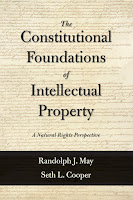Copyright protections secured by federal law preempt state laws that interfere with them. Yet the Maryland legislature apparently ignored or didn't realize that when it enacted Maryland House Bill (HB) 518 in May of this year. The law, if it goes into effect in 2022, would grant Maryland public libraries a state-level compulsory license to access eBooks, audiobooks, and other digital literary works belonging to copyright owners at state-regulated rates. But a lawsuit filed in U.S. District Court on December 9 almost certainly means that the state's law will have a short shelf life.
Maryland HB 518 seeks to give Maryland public libraries a special right of forced access to privately-owned digital literary works on supposed "reasonable terms." But under the U.S. Constitution's Copyright Clause and Section 106 of the federal Copyright Act, copyright owners possess exclusive rights to decide who can reproduce, distribute, display, and publicly perform their works and under what conditions. Indeed, the Copyright Act is the exclusive source of law governing the exclusive rights of copyright owners. As a result, Maryland HB 518 is expressly preempted by federal law – and it's not a close call.
The Copyright Act's exclusive jurisdiction over the exclusive rights of copyright owners is stated – in unmistakably broad terms – in Section 301(a)'s preemption provision:
On and after January 1, 1978, all legal or equitable rights that are equivalent to any of the exclusive rights within the general scope of copyright as specified by section 106 in works of authorship that are fixed in a tangible medium of expression and come within the subject matter of copyright as specified by sections 102 and 103, whether created before or after that date and whether published or unpublished, are governed exclusively by this title. Thereafter, no person is entitled to any such right or equivalent right in any such work under the common law or statutes of any State.
In our most recent book, Modernizing Copyright Law for the Digital Age: Constitutional Foundations for Reform (Carolina Academic Press, 2020), FSF President May and I strongly urged Congress to reject any future imposition of compulsory licensing and rate regulation on copyrighted works because such onerous restrictions are antithetical to the property rights and free market foundations of American copyright law and policy. Similarly, Maryland and other states should refrain from trying to impose compulsory licenses and rate controls on copyrighted works.
In view of the strong legal claims raised against Maryland HB 518 in the pending case of Association of American Publishers, Inc. v. Frosh, it is most likely that the law will never go into effect. Other states should learn from HB 518's bad example and not seek to repeat it.






